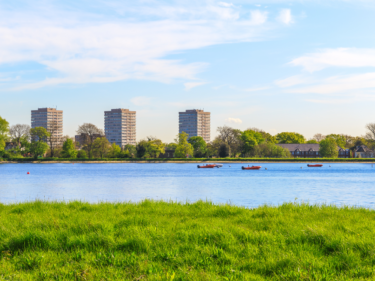Recent Release | 18 May 2023
Hackney’s Green Economy: An asset to be nurtured

Cities Consulting Team
Oxford Economics

In early 2023 the Hackney Council commissioned Oxford Economics, in partnership with Ramidus, to research the current scale and specialisms of Hackney’s green economy and identify future opportunities and potential barriers to growth.
The study assesses the current scale and specialisms of Hackney’s green economy and identifies future opportunities and potential barriers to its growth. It also investigates the presence and degree of green business networks within the borough and hence gains an understanding of clustering activity. The approach builds on existing data and supplements it with new survey data and other analyses using:
- Chain referral methods or ‘snowballing’ for expanding the survey sample.
- Data validation and GIS mapping.
- An advanced desk-based research method called network analysis.
- On-the-ground meetings and workshops with local businesses.
The research was conducted across two stages. Stage 1 was focused on measuring the number of Hackney businesses operating in the green economy. Stage 2 developed the understanding of Hackney’s green economy and its characteristics. The final report brings together both stages of this research and concludes with our recommendations to build a stronger green economy in Hackney.
To download the report, please complete the form below.
The experts behind the research
Our cities consulting team specialise in analysing and forecasting cities and regions around the world. Drawing on our detailed forecast data and a range of modelling tools, we work with clients globally across sectors to produce studies tailored to their needs and to help them make informed decisions.

Tim Lyne
Associate Director, Cities & Regions

Meera Sadier
Senior Economist, Cities & Regions
Read the report
Complete the form below to download the report.
Tags:
You might also be interested in

Mapping the Plastics Value Chain: A framework to understand the socio-economic impacts of a production cap on virgin plastics
The International Council of Chemical Associations (ICCA) commissioned Oxford Economics to undertake a research program to explore the socio-economic and environmental implications of policy interventions that could be used to reduce plastic pollution, with a focus on a global production cap on primary plastic polymers.
Find Out More
How Canada’s wildfires could affect American house prices
The Northern Hemisphere is now heading into the 2024 fire season, having just had its hottest winter on record. If it is anything like last year, we can expect to see further impacts on people, nature, and global markets.
Find Out More
Beyond assumptions – the dynamics of climate migration
Millions of people have already been displaced because of environmental shocks, but many aspects of climate migration remain poorly understood. This confusion has led to oversimplified assumptions about its causes and effects – in reality, it’s more complicated and has many nuances.
Find Out More
Greenomics – Ep. 9 | The nature of Travel & Tourism
A discussion of the crucial role of climate-ready buildings in the global push towards a net-zero future. They delve into sustainable construction practices, the importance of regulations, retrofitting existing buildings, and behavioural changes to create environmentally friendly homes. The conversation also touches on the economic challenges and choices associated with transitioning to sustainable living.
Find Out More